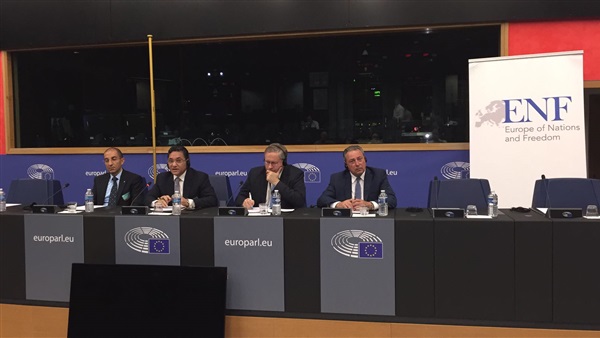Ali unveils Brotherhood strategies in Europe

CAIRO – Director of the Center for Middle East
Studies in Paris and Chairman of the Board of al-Bawaba News Institution, Abdul
Rahim Ali, threw light Tuesday on the Muslim Brotherhood's strategies in the
societies where it has presence.
The Brotherhood, he said, pays special attention to
the training of its individual members on the road to controlling families and
then societies.
He added at a seminar at the headquarters of the
European Parliament in Strasbourg, France, that the Brotherhood works to
control societies in the hope of forming an Islamic government and then
establishing an Islamic Caliphate.
The Brotherhood does all this in the hope of
realizing its dream of being the master of the world, a situation where a
Brotherhood system can prevail in the whole world, Ali said.
This, he said, was the dream of the man who founded
the Brotherhood in Egypt in 1928, when the movement had five members only.
The same group reached power in Egypt 86 years
later, exactly in 2012, Ali said.
He noted that the Brotherhood follows the same
strategy in Europe by creating a halal (something that goes hand in hand with
Islamic law) market.
It does the same here, he added, by controlling
mosques, schools and spreading their ideology in all European capitals, in
Munich, in Paris and in Brussels.
Ali warned against the devastating effects the
Muslim Brotherhood's strategy will have on European values, including religious
and intellectual diversity, respect for women and free speech.
He said the Brotherhood preaches the opposite of all
these European ideals at the mosques they control in European suburbs and their
charities in European cities.
He referred to what he described as the
"huge" funding the group receives from different countries.
The Brotherhood, he said, uses this funding in
training one generation after another of terrorists.
He said the Brotherhood feeds terrorism by spreading
hatred and extremism.
All those who staged bomb attacks in France, Ali
said, were fed the ideology of the Muslim Brotherhood at mosques controlled by
the movement.
He rang the alarm about extremism seeping out of the
mosques and into the artistic field.
Ali mentioned the example of Algerian-French singer
and composer, Madian, who wanted to sing a song about crucifying westerners at
the Bataclan Theatre, the site of multiple bomb attacks in which many French
lives were lost.
In doing this, Ali said, Madian demonstrates
contempt to the sentiments of French citizens, getting support from Qatar which
owns a 70% stake in the theatre.
Ali's seminar at the premises of the European
Parliament in Strasbourg is a clear victory for him against the background of
pressures exerted in the past weeks by Qatar and the Muslim Brotherhood for the
European representative institution to cancel the event out.
In making this pressure, Qatar and the Brotherhood
shuddered at the prospect of Ali divulging more secrets about terrorism
financing and the activities of the International Organization of the Muslim
Brotherhood in Europe.





